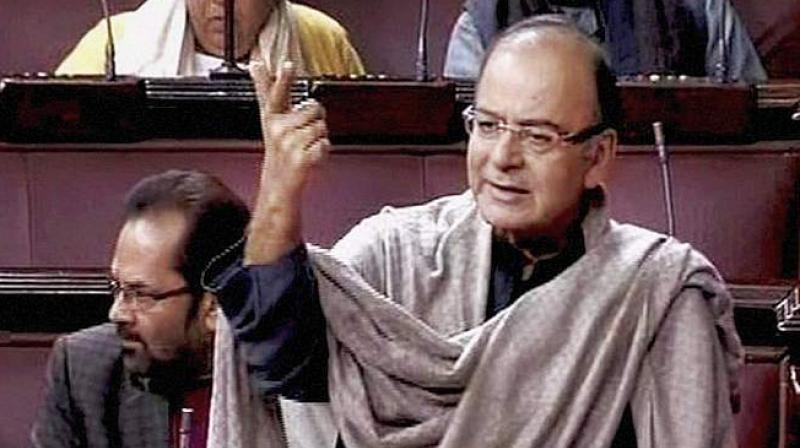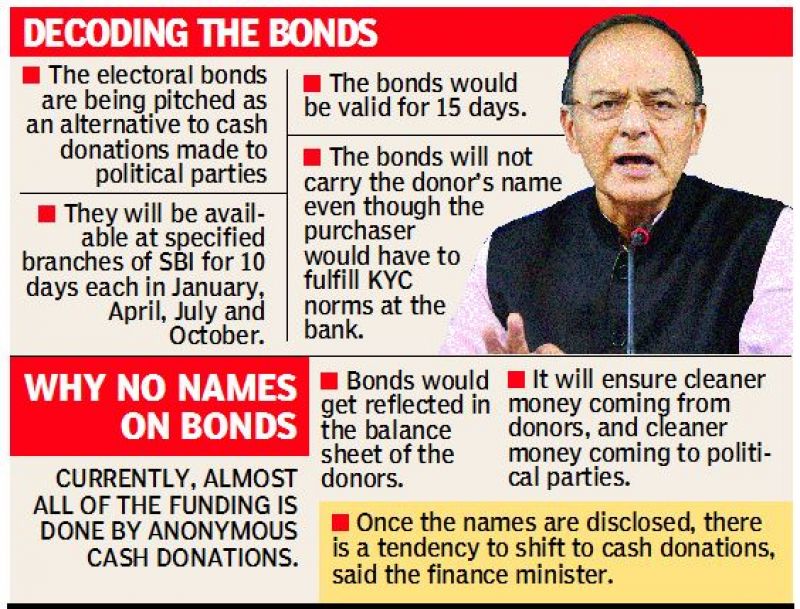Poll bonds will be sold for up to Rs 1 crore
Finance Minister Arun Jaitley outlines contours of bonds for political funding.

New Delhi: Keeping its promise of cleaning up election funding, the government on Tuesday notified the scheme of electoral bonds. A donor can now buy these bonds from the State Bank of India and give them to political parties which can encash them only through a designated bank account.
The takeaway from this scheme, which finance minister Arun Jaitley had announced in his budget speech, however, is that the name of the person buying the bonds will be kept secret though he or she has to fill up a KYC form. The bonds will provide an alternative to cash donations made to parties. The bond can be bought for any value, in multiples of Rs 1,000, Rs 10,000, Rs 1 lakh, Rs 10 lakh or Rs 1 crore.
Making an unscheduled announcement on the scheme in the Lok Sabha, he said, “The government has now finalised the scheme of electoral bonds.” After Mr Jaitely shared the contours of the scheme, Congress leader Mallikarjun Kharge questioned as to what purpose the bonds will serve without disclosing the donor’s name. To this, Mr Jaitley replied that the bonds will get reflected in the balance sheet of the donors. “It will ensure cleaner money coming from donors, cleaner money coming to political party and ensure significant transparency,” he said.
Time limit bars bonds’ misuse
Finance minister Arun Jaitley said, at present, details of donors, quantum and source of funds is not known. The electoral bonds can be given to any registered political party which has secured at least one per cent vote in last election.
That party will have to give details of one bank account to the Election Commission and it will have to be encashed within 15 days.
The bonds resembling a promissory note will not carry any interest. The lender will remain the custodian of the donor’s funds until the political parties are paid.

The bonds will be available at specified branches of State Bank of India (SBI) for 10 days each in months of January, April, July and October. The bonds will be valid for 15 days.
Later talking to reporters, Mr Jaitley said that the 15-day validity time has been prescribed for the bonds to ensure that they do not become a parallel currency.
“Every political party will file before Election Commission return as to how much money has come through electoral bonds,” he said.
When the government had announced its intention to launch electoral bonds last year, it had not put a time-bar on the redemption of electoral bonds, leading to several experts questioning its motive.
Financial experts and anti-corruption activists feared that the issue of bearer bonds of high value could lead to the rich converting their black money into the bonds for convenience of storage.
Prime Minister Narendra Modi had also started a debate on the government’s funding the election expenses of political parties to curb corruption.
Good or bad
The 15-day limit on the validity of electoral bonds is positive as it would prevent the restricted-bearer bonds from becoming alternative to cash or making it easier for the rich to hoard cash in the form of bonds. However, there are questions that need clarifications.
Some of them are
Government: Electoral bonds must be bought with accounted or white money only.
Question: If companies are expected to use only white money for buying electoral bonds, they could even now donate money through cheque, which is completely transparent.
Government: Electoral bonds would cleanse the system of electoral funding.
Question: If a donor wants to be anonymous, he would donate money in cash or use proxies to buy the electoral bonds. The second route would create secondary market for electoral bonds and a chain of agents. So how does it cleanse the system?
Government: Donor's identity would remain secret.
Question: When the donor is using white money for buying electoral bonds, why should the donor's identity remain secret? Is it to protect companies and political parties from the subsequent allegations of quid quo pro at a later date when the ruling party seeks to return the favour?
Government: Electoral bonds would be valid only for 15 days from the date of issue.
Question: When a cheque, which doesn't have a validity limit, can be issued to political parties, why should companies or individual donors take pain of converting their money into electoral bonds? Won't the online fund transfer to political parties' bank accounts be a better alternative?
Government: Electoral bonds would bring transparency in electoral funding as it will eliminate cash funding.
Question: A donation to a political party through a cheque would have been much more transparent than electoral bonds. But the funding through cheques did not gain currency in India. As companies didn't want to burn bridges with different political parties, cash remained king. Though electoral bonds do not have the name of purchaser, the bank would have all the details of the purchaser, which can help the ruling party for witch hunting the funding sources of rival parties. So what benefits companies have in electoral bonds that cheque-based donations did not have?

